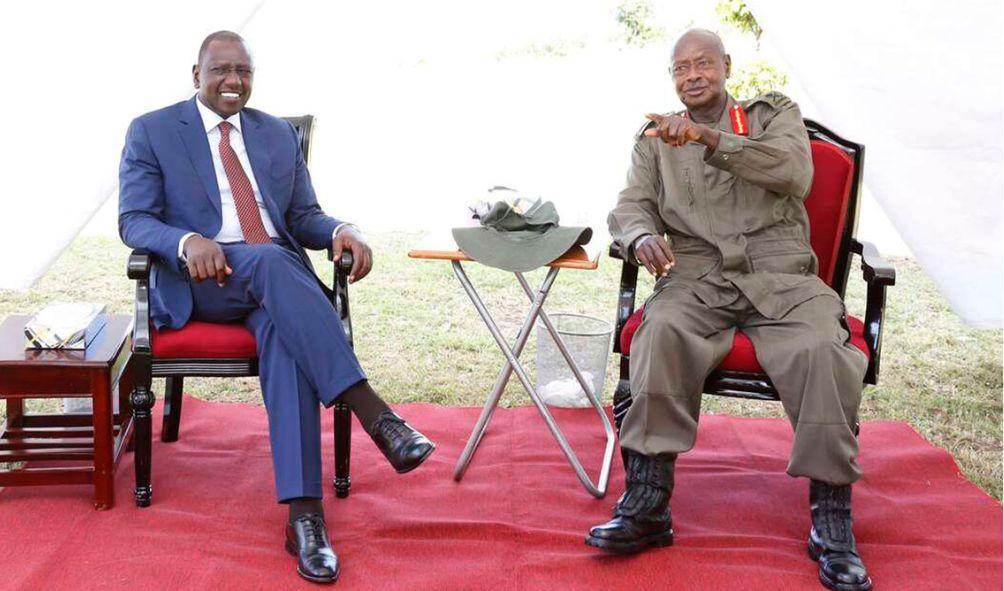Ruto and Museveni’s Summit: High-Stakes Talks to Resolve Oil Deal Clash
Cabinet Secretary Peninah Malonza has announced that President William Ruto plans to hold discussions with Uganda’s President Yoweri Museveni to address their diplomatic differences. The meeting will focus on issues related to the East African Community, ASALs (Arid and Semi-Arid Lands), and regional development.
Malonza mentioned that the leaders of the two nations plan to have a meeting following Kenya’s decision to prevent Uganda from utilizing the infrastructure of the Kenya Pipeline Company (KPC) for transporting refined petroleum products from the Mombasa port to Uganda. This action was taken in response to a new directive from Uganda’s Cabinet.
“There is a scheduled meeting between the two presidents to discuss the impasse and Kenya will also seek to explain its position at the next East Africa Community (EAC) Heads of State Summit,” Malonza told journalists as quoted by Daily Nation.
She additionally brushed aside concerns about the trade dispute potentially endangering the development of diplomatic relations between the two countries, stating her belief that the meeting would result in favorable outcomes.
“There is no cause for alarm because such trade disagreements are normal. Each country is founded on different laws and principles, that is why we deal with each other based on the binding treaties and other diplomatic protocols,” she said.
“Uganda is not only Kenya’s trading partner. It is also the largest market for Kenyan oil, Nairobi and Kampala have coexisted very well since independence and both countries value each other’s economic potential.”
In November of the previous year, Uganda terminated its oil agreements with Kenya, stating that the country had been acquiring oil products from intermediaries in Kenya at excessively high costs, worsening Uganda’s fuel shortage.
“Without my knowledge, our wonderful people were buying this huge quantity of petroleum products from middlemen in Kenya,” Museveni wrote on X.
“A whole country buying from middlemen in Kenya or anywhere else!! Amazing but true.”
More than 90% of Uganda’s petroleum products are brought in via the Port of Mombasa in Kenya, with the remainder arriving through the Dar es Salaam port in Tanzania.
ALSO READ:
- Make April your winning month with AfroPari!
- Why Money Collected From Tourists Was Banked in Swiss Accounts – Gov’t
- Hanna Cheptumo Says Her Family Is Worth Ksh.420 Million During Cabinet Vetting
- Ruto’s Gender CS Pick Blames Femicide on ‘Greedy Women Chasing Money’ — Claims Education and Independence Could Stop the Killings
- Kelvin Kiptum’s Father Demands Justice and Compensation from President Ruto
The licensed Ugandan Oil Marketing Companies independently conducted the importation, utilizing the importation frameworks established in Kenya and Tanzania.
On January 2, 2024, Uganda filed a lawsuit against Kenya, alleging that Kenya had deprived the Uganda National Oil Company (UNOC) of the rights to function as an Oil Marketing Company (OMC) within the Kenyan territory.
The UNOC endeavored to transport fuel products via the Kenya Pipeline, but the Energy and Petroleum Regulatory Authority (EPRA) instructed Uganda to register as an oil marketer in Kenya to utilize the pipeline.
EPRA requested UNOC to meet various criteria, including obtaining business registration certificates, providing identification documents for each director, obtaining work permits, securing a tax compliance certificate, demonstrating financial capability with evidence of sales volumes amounting to 6.6 million liters of super petrol/gasoil or A1jet or kerosene in Kenya, showcasing operation of five licensed retail stations, and running a licensed depot with a turnover of USD 10 million in the past three years.
UNOC was unable to furnish all the necessary documents and regarded certain requirements as cumbersome. The organization asserted that being a wholly state-owned entity in Uganda, its sole purpose was to transport products through Kenya, with no intention of engaging in business activities within Kenya.
Uganda has escalated the matter to the East Africa Court of Justice (EACJ), attributing the delay in receiving exemptions from EPRA’s requirements to the responsibility of the Kenyan government.
Ruto and Museveni’s Summit: High-Stakes Talks to Resolve Oil Deal Clash
